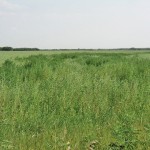
Tag Archives United States Department of Agriculture

Students learn about agricultural practices through interactive event
Teachers in western Manitoba consider Agriculture in the Classroom events highly important to both urban and rural students

Politics and the revenge of the food consumer
The USDA has decided to act on growing pressure and establish a voluntary program to label food products with non-GMO content

Tank mixing weed killers helps delay herbicide-resistant weeds
But don’t forget to rotate crops, including fall seeded and perennials, advises AAFC’s Hugh Beckie

Agriculture in the Classroom formalizes and elects chair
After more than 15 years of directing the Manitoba chapter of Agriculture in the Classroom, Johanne Ross has been elected as the chair of the national chapter

Vesicular stomatitis: A travel advisory
Horse Health: The rules have changed for transporting horses across Canada-U.S. border

Representative sample critical in grading grain
Norm Woodbeck also says the U.S. and Canadian wheat-grading systems are as different as apples and oranges

KAP calls for mandatory reporting of grain prices
Farmers need more information

Breakfast for Learning programs help kids get ahead in school
Recipe Swap: No-Bake Breakfast Bars

KAP calls for special assistance
It’s urging the province to request AgriRecovery


